News
12 steps to being an eco diver
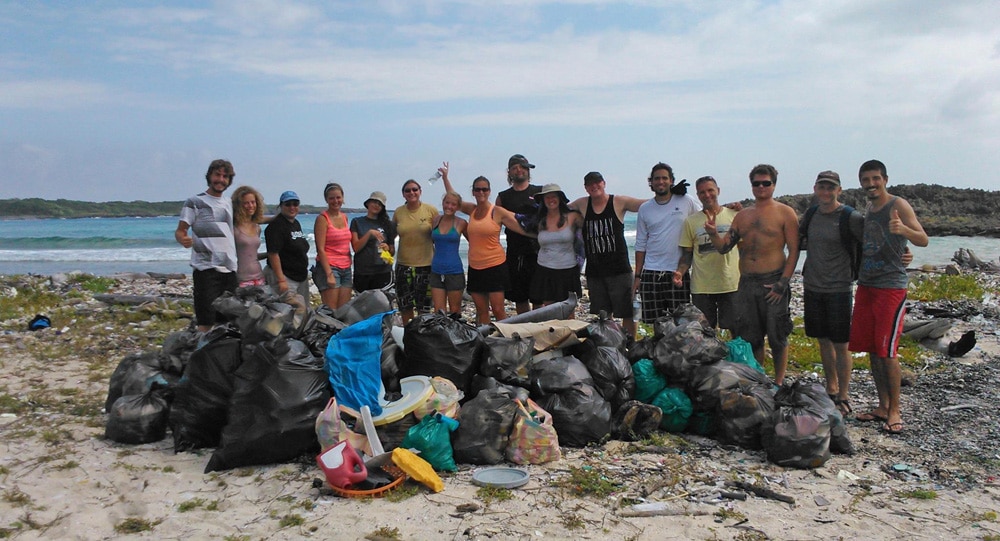
For most divers, I think we feel pretty privileged to get to see and enjoy the amazing underwater world. As the plight of our oceans and coral reefs becomes more prominent in the news and on social media, often divers find ourselves probably a bit more aware of the value of the life beneath the waves and the issues affecting it. Therefore, it can be quite distressing when we learn that not all of the negative impacts on coral reefs are from large scale human impacts like climate change and overfishing, but that in some areas, lots of damage comes directly from divers and diving tourism, particularly in those areas that experience a high density of divers year round.
So, how do we divers, who love our sport and the underwater world, overcome the negative impacts and turn our actions into positives?
Here’s a list of 12 easy things we can do to minimise our impact:
1. Be choosy about your dive centre
There are lots of dive centres out there going above and beyond to be green, teaching and supporting good dive practices and minimise their environmental impact. A little research before hand and you can find centres that give marine biology talks, do beach cleans and work on an environmentally-friendly basis. Generally I find I have a better time and get more from holidays like this. The Green Fins website is pretty helpful.
2. Buoyancy
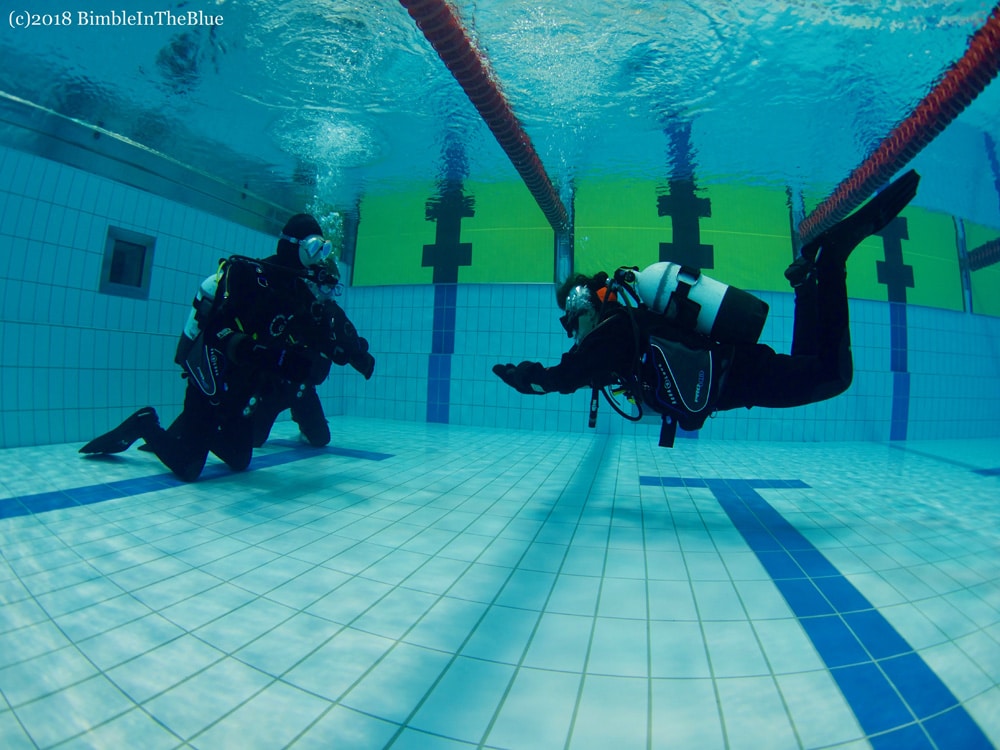
Buoyancy is massively important for both enjoying the dive, improving air consumption and also not trashing the environment you are diving in. Practice makes perfect, so you are never too good to try and improve; skills get rusty after a break even for experienced divers. There are lots of places offering courses specifically designed to improve buoyancy, so it’s a great excuse for more diving!
3. Do not touch anything
There may be an odd occasion you need to hold onto a rock if you’ve just run into a strong current or use a finger to stabilise yourself for a moment in an emergency. If you can pick a bit of rock without growth or a bit of dead coral to hold onto, this is best.
However if you are regularly holding onto stuff or bouncing off the bottom, then it’s time to go back to basics and get your buoyancy under control. If not for the sake of the environment, but yourself, particularly when you realise you just grabbed hold of a stonefish…
4. Reef safe sun screen
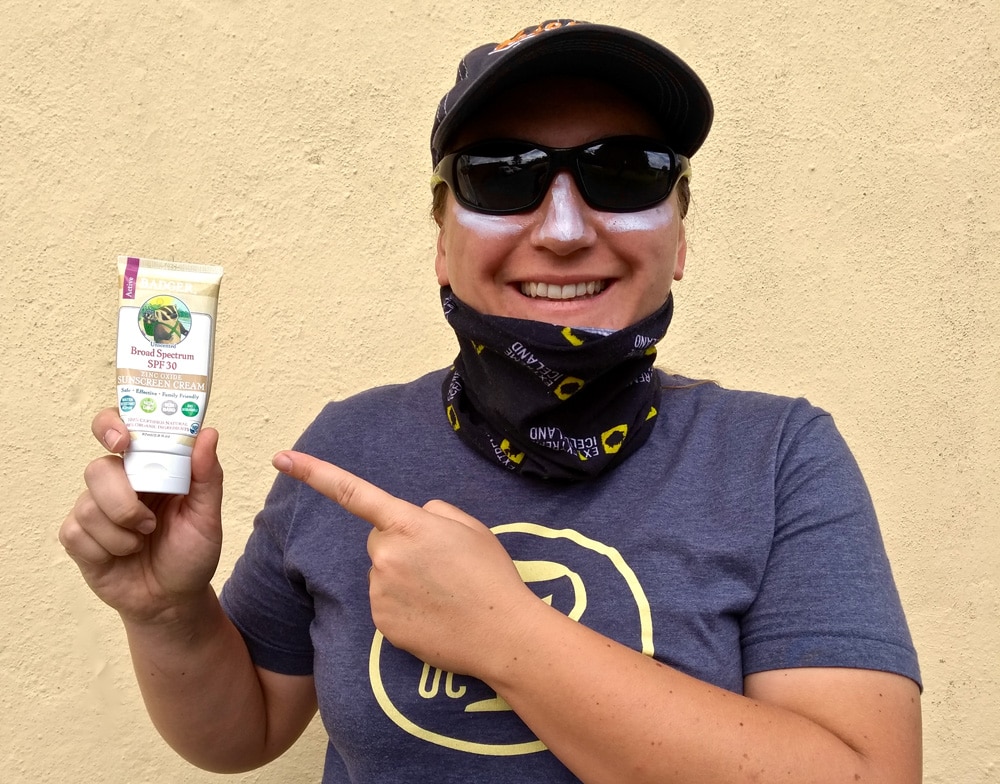
On a tropical dive holiday, chances are you will be using sunscreen to avoid sunburn and the associated health risks and pain that come with it. Many sunscreens contain oxybenzone, which is very bad news for reefs, as it kills coral. Since we know we will be in the water and some of the sunscreen will be washed off, by using a reef safe sunscreen, we ensure our diving activity doesn’t pollute the water for the corals we are there to see! For a list of Reef Safe Sunscreens click here! You could even forego the sunscreen entirely and wear a sun hat and UV-protective clothing instead.
5. Reusable water bottle
Keeping hydrated is a must in diving as hydrated divers are less likely to get the bends or suffer heat related issues in hot climates. By using a reusable water bottle, you can reduce the amount of single-use plastic entering the environment. Having your dive centre refill your own bottle it also often works our cheaper than buying bottled water from the shops.
6. Do not tip bad guiding
If your dive guide moved that frogfish/seahorse for you to get a photo, ask them not to touch or move anything. A photo is never worth killing something by stressing it out. If they guided you deeper than the original dive plan to show you something, or deeper than you are qualified/ comfortable going, ask to stick to the dive plan next time. Plan the dive, dive the plan. Ultimately you are responsible for your dive and your safety. Guides do what they think will make customers happy because happy divers tip. If your guide is acting like a cowboy, it’s probably because previous divers have rewarded this behaviour.
7. If you are a photographer, remember your surroundings
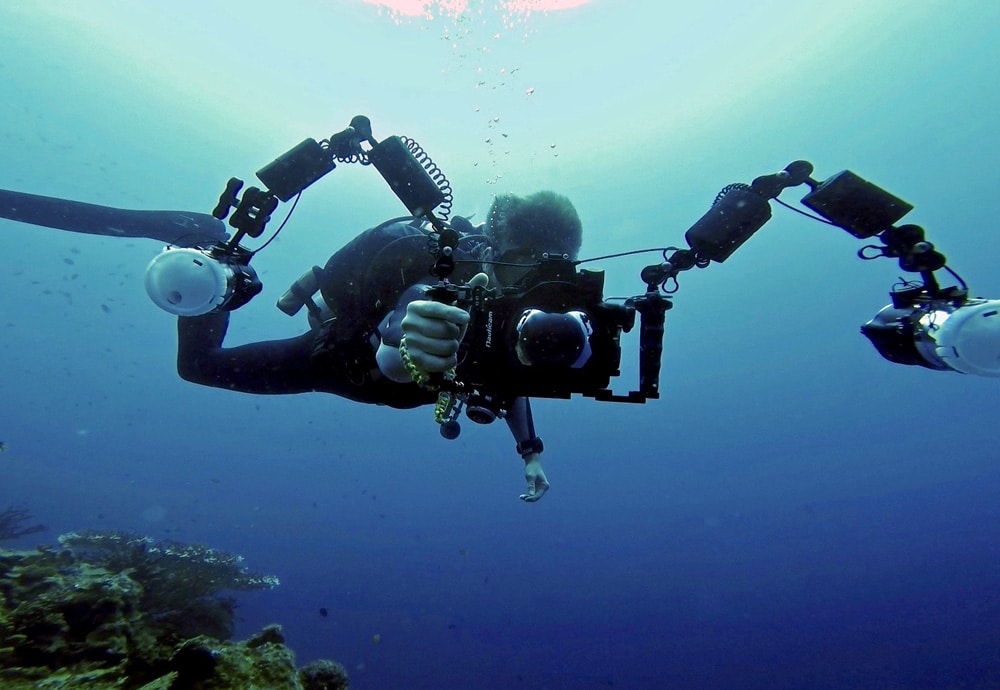
Never move anything, try not to touch coral or lie on the bottom. If you need to hold onto something to get your photo, then it’s back to work on your buoyancy before going in the water with a camera! Often taking a few well planned shots is best. Many creatures, such as seahorses are sensitive to light, so taking a few good photos and moving on ensures they are not permanently blinded by multiple strobe flashes. Also spare a thought for others in the dive group, by sharing the view of a nice critter, it reduces the likelihood of lots of divers crowding one spot and inevitably someone kicking something, causing damage and kicking up sand and silt.
8. Use spit, rather than washing up liquid or shampoo
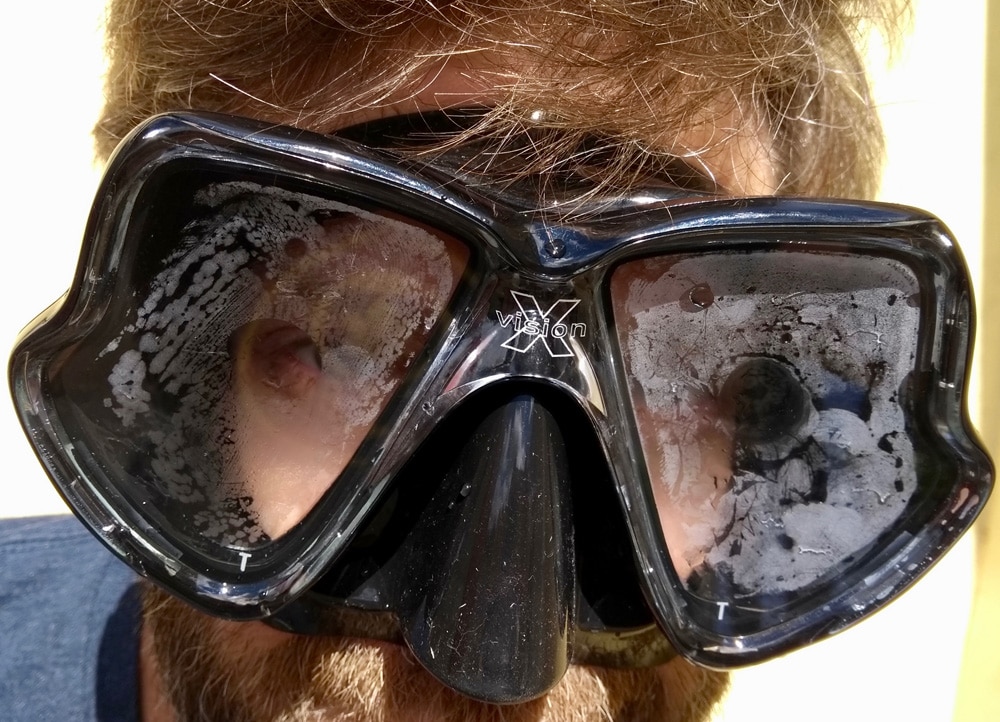
There are a few biodegradable defog options out there for anyone who’s spit is not very effective at keeping their mask fog free, but for the majority of people spit works really well! It’s free, it doesn’t need time to break down to do no harm to the environment and you always have it with you!
9. Get involved in reef surveys or clean-ups
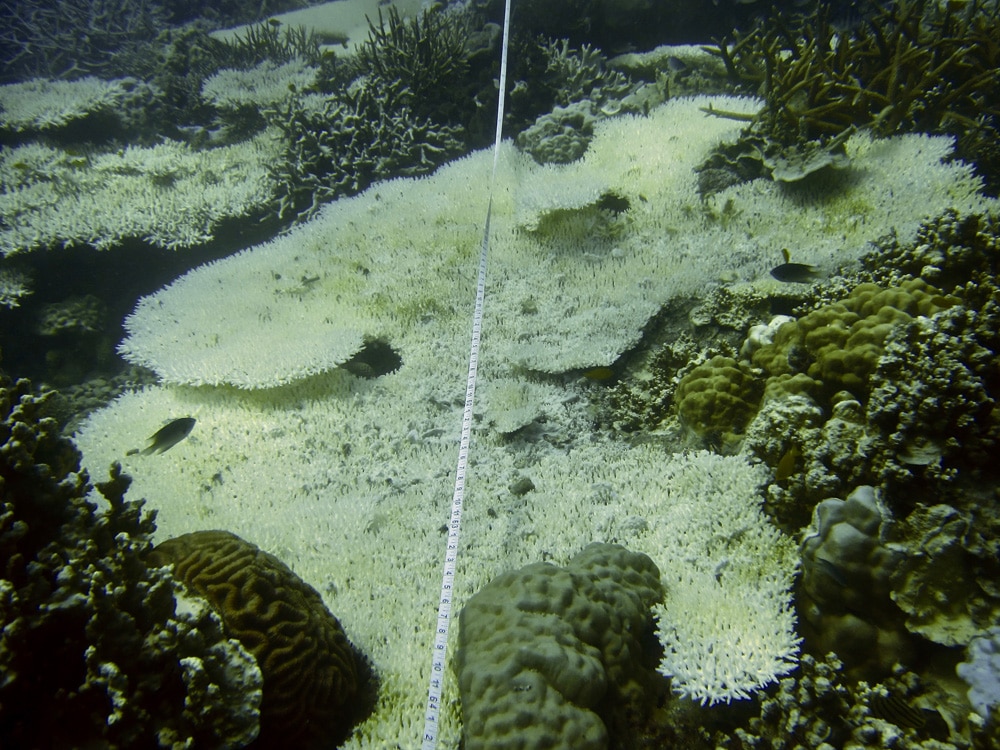
One of the absolute best ways to be sure you are having a positive impact is to give up some of your time to help clean up an area. Many dive centres and organisations will very gladly accept your help on a local beach clean or dive clean up. If you know your fish and coral you can also help by taking part in reef surveys, such as Seasearch, REEF, Reef Check or Coral Watch. Many eco dive centres teach these courses if you would like to hone your underwater ID skills and help gather data for science and conservation.
10. Think about your impact on land
Even though many of us wish we could live underwater sometimes, we do spend the majority of time on land and here we can make a huge difference that will help all environments and our oceans. We can reduce our dependence on single – use plastics that may end up in the ocean, by using reusable water bottles, coffee cups, straws and bags made from recyclable plastics or even better, alternatives like bamboo. Also, have a think about where you stay when on dive holidays, does the hotel try to avoid single use plastics? Do they recycle? What happens to the waste water? Again, with a little research good, affordable eco options can be found for accommodation. It’s always good to know you won’t be diving in water that your waste is going into!
11. Support initiatives to clean up the oceans
There are many great organisations out there attempting to make a difference. We can join charities like Marine Conservation Society, or buy products from clean up programmes. Fourth Element have a new swimwear range made from ghost netting and there are some very good looking flip flops made from recycled ocean plastics. New things are coming on the market all the time, they look good and are a great example of reusing and recycling. Have a search for what is going on near you and how you can support the movement.
12. Try not to eat the seafood you have just been diving with! (The invasive Caribbean lionfish aside).
If you were wondering why there weren’t as many fish as the last time you dived here, and you then go and order a reef fish for lunch at the hotel…you may have found your answer! For a guide on what is sustainable on most menu’s and what to avoid click here. For recipes for cooking the delicious and invasive Caribbean Lionfish, click here!
Blogs
Discover Curaçao with the Ultimate Dive Vacation Guide – 2024 DEMA Special Edition

Dive Travel Curaçao is thrilled to announce the launch of the Curaçao Dive Vacation Guide – 2024 DEMA Special Edition, an expertly curated resource that unveils the unparalleled dive experiences and vacation possibilities awaiting you in Curaçao. Produced exclusively for the Diving Equipment & Marketing Association (DEMA) Show 2024, this special edition guide is packed with exclusive insights, travel tips, and limited-time DEMA offers that make it easier than ever to explore Curaçao’s stunning underwater landscapes and vibrant culture.
Explore Curaçao’s Unmatched Diving Opportunities
With over 70 diverse dive sites along its southern coastline, Curaçao is a bucket-list destination for divers of all experience levels. From thriving coral reefs and intricate marine ecosystems to historic shipwrecks, the island offers a variety of underwater experiences that are hard to match. The Curaçao Dive Vacation Guide – 2024 DEMA Special Edition provides detailed recommendations for both shore and boat diving, making it a valuable tool for divers seeking the best entry points, pristine reefs, and hidden treasures along the coastline. Whether you are an avid wreck diver, or a beginner interested in shallow reefs, Curaçao has it all.

Uncover Eco-Friendly Dive Resorts and Top Dive Operators
This DEMA 2024-exclusive Curaçao guide goes beyond diving to feature insider information on Curaçao’s eco-friendly accommodations, dive resorts, and top-rated dive operators committed to sustainable dive tourism. From all-inclusive resorts that support coral reef restoration initiatives to charming boutique hotels near prime dive locations, the guide helps travelers find the ideal stay to match their vacation goals. It also spotlights trusted dive operators on the island who prioritize environmental preservation, offering travelers a way to enjoy the underwater world responsibly.

Immerse Yourself in Curaçao’s Culture, Culinary Delights, and Adventure
Curaçao offers a vibrant Caribbean culture rich in history, music, and culinary fusion. The guide reveals Curaçao’s hidden gems, including culinary hotspots, historical sites, and eco-tourism opportunities that will appeal to both divers and non-divers. Visitors can explore the island’s iconic architecture, savor a diverse range of dishes influenced by Caribbean, European, and South American flavors, and embark on land-based eco-adventures, such as hiking, cave exploration, and visiting national parks.

Exclusive DEMA 2024 Specials and Limited-Time Dive Packages
This special edition guide features limited-time DEMA 2024 offers on dive packages, accommodations, and excursions. Travelers who book through Dive Travel Curaçao, or our Curaçao dive travel partners attending DEMA, will have access to exclusive discounts on custom dive vacation packages, making it easier to plan an affordable, high-quality dive trip that fits your preferences. The Curaçao Dive Vacation Guide – 2024 DEMA Special Edition is designed to simplify your travel planning and help you dive deeper into the incredible experiences that Curaçao has to offer.
It’s Time to Dive Curaçao!
Now is the time to discover why Curaçao is a top dive destination in the Caribbean! Dive Travel Curaçao invites you to experience an unforgettable dive vacation with exclusive DEMA 2024 specials tailored just for you. To secure your spot, download a copy of the Curaçao Dive Vacation Guide – 2024 DEMA Special Edition and contact the Dive Travel Curaçao team to start customizing your Caribbean dive adventure today.
For more information and bookings, please visit Dive Curaçao’s website or contact our reservations team directly.

News
Santa Divers take the Plunge for Charity

Ho Ho Ho! Vobster Quay’s recording-breaking charity Santa diving event returns on Sunday 15th December 2024 for another round of festive fundraising frivolities. Run in aid of the Royal National Lifeboat Institution (RNLI) and Help For Heroes, this ever-popular annual fundraising event aims to raise sack-loads of cash for these two very deserving charities.
Divers of all levels are invited to grab their Santa outfits – and as much festive cheer as they can muster – and head down to Vobster Quay near Mells, Somerset for a mass sponsored Santa dive in aid of charity. In previous years, the event has attracted divers from the far corners of the UK to join in the festive merriment for a final festive dive before the Christmas and New Year break. Back in 2015, the event smashed the world record for the most Santa divers with 188 divers taking to the waters donning their festive finery – a record that remains unbeaten to this day!

Vobster Santas isn’t just about setting records – it’s also about raising some serious cash for charity. Vobster Quay encourages all divers to get into the spirit of the season to raise much-needed funds for two very deserving charities – the Royal National Lifeboat Institution (RNLI) and Help For Heroes.
Through individual sponsorship and online donations, divers can invite their friends, family and work colleagues to sponsor them to plunge into the balmy waters of Vobster Quay dressed in full festive finery. Since the very first Santa dive in 2007, the event has raised over £52,000 for charity. “It’s been over 17 years since the very first charity Santa dive took place at Vobster Quay and every year the event just keeps getting bigger and better” enthused Vobster Quay owner, Amy Stanton.
“Vobster Santas is a great way for divers to say a massive thank you to the both the RNLI and Help For Heroes – two very deserving charities close to our hearts. We’re immensely proud of all that Vobster Santas has achieved and hope that even more divers will join this year’s event on Sunday 15th December. I’m confident that we can make Vobster Santas 2024 the biggest yet!”.
Divers wishing to participate can get involved by simply registering their attendance at
www.vobster.com/event-vobstersantas.php.

-

 News1 month ago
News1 month agoIconic SS United States to become the World’s Largest Artificial Reef
-

 Blogs3 months ago
Blogs3 months agoNovoScuba’s Game-Changing Approach for Dive Store Owners: WE PAY YOU!
-

 News2 months ago
News2 months agoBook Review – 52 Assignments: Underwater Photography
-

 Gear News2 months ago
Gear News2 months agoDYNAMICNORD – New German diving brand enters the British market
-

 News2 months ago
News2 months agoExploring Cenote El Pit: A Diver’s Dream
-

 Gear News2 months ago
Gear News2 months agoTry BARE drysuits (and maybe even win one!) this Friday with Sea & Sea at North West Dive Fest
-

 News3 months ago
News3 months agoComing Soon – 52 Assignments
-

 News3 months ago
News3 months agoSave £200 per person per week at Pole Pole Lodge with Dive Worldwide













